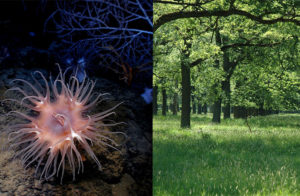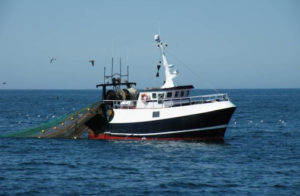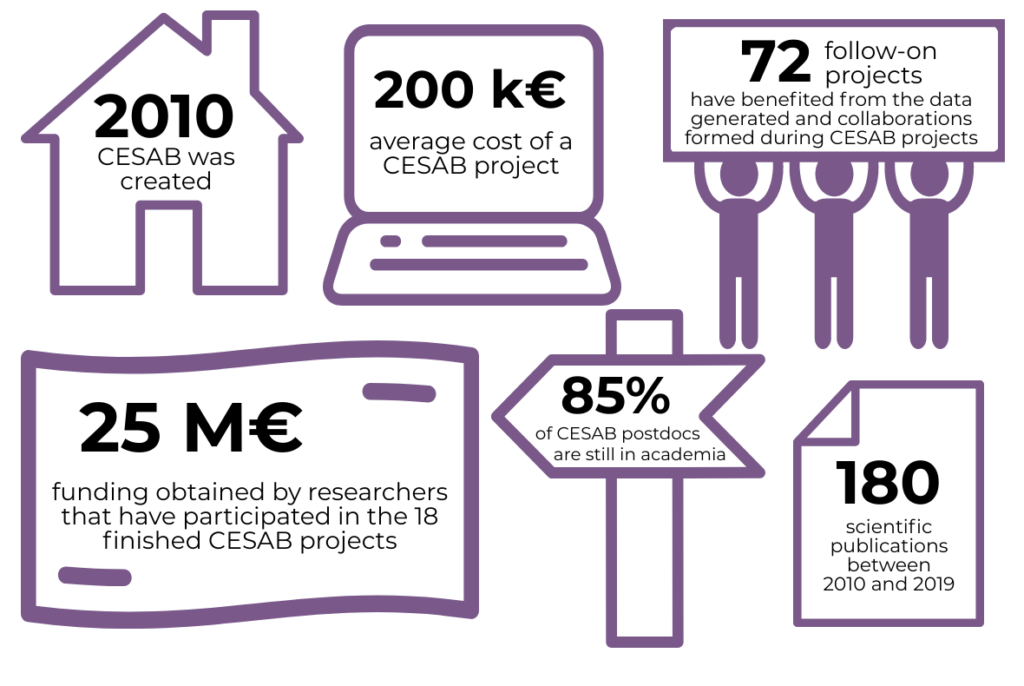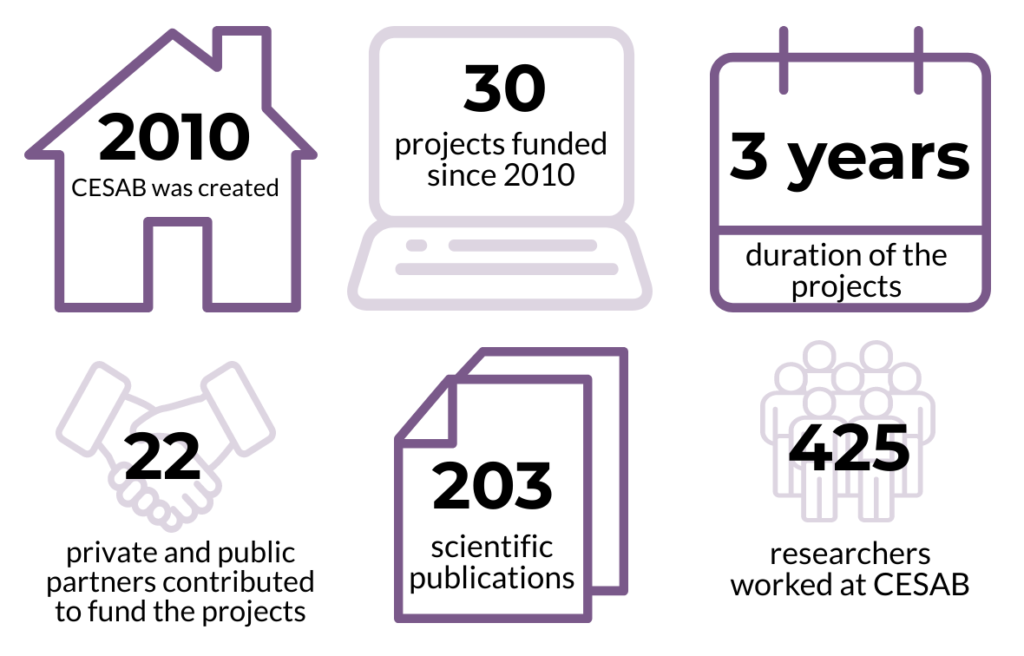[FRB-CESAB] Newsletter 3 CESAB – July 2020
The FRB’s Center for Biodiversity Synthesis and Analysis (CESAB) is a research structure with an international scope whose objective is to implement innovative work on the synthesis and analysis of existing data sets in the field of biodiversity. Twice a year, the CESAB publishes a newsletter listing the different news and activities going on.
A WORD FROM THE CESAB SCIENTIFIC DIRECTOR
 Nicolas Mouquet
Nicolas Mouquet
We have all been affected by the Covid-19 pandemic. Even if it is too early to decipher the conditions that triggered the emergence of the coronavirus, it is, as other major epidemics, related to the environmental and biodiversity crisis we are experiencing.
Prevention could have been possible but they waited for the crisis to appear before acting. Prevention should be at the basis of our collective behavior, prevention and not fear! Prevention requires that we take the time to understand the world and synthesize complex information into meaningful and useful collective knowledge. What is true for the pandemics is true for the ongoing biodiversity crisis. The need for synthesis has never been so strong, synthesis is the only way of fueling appropriate actions. Furthermore, the timescale needed to achieve adequate and reliable synthesis is far longer than the rapid appearance of human-caused crisis. Synthesis must happen before!
Edward O. Wilson once said that the world would be run by “synthesizers, people able to put together the right information at the right time, think critically about it, and make important choices wisely”. For once, he was wrong, the world is not run by synthesizers, it is run by people that base their actions on incomplete information, are behind the limes, do not think critically and do not make wise choices ! This is why, today, we need synthesizers more than ever, and yet I do not see very much of collective effort to support synthesis in the agenda of research funding agencies. At our very small scale, synthesis centres, such as CESAB, are trying to promote the art of synthesis in biodiversity science but the level of funding we are receiving is inversely proportional to the importance of our mission.
After every crisis, we hear voices saying that the “world will never be the same again”. This is not true, a simple synthesis of crises during the 20th century show the exact opposite pattern. However, this does not mean that we have to give up, but rather that we need to understand and remember: we must synthesize !
Nicolas Mouquet

The FRB, with the support of ITTECOP programme, call on the scientific community to submit projects to the CESAB, based on the analysis and synthesis of existing data on the theme “Territorial approach to biodiversity: transport infrastructures, natural and agricultural environments” at a European geographic level.
The projects will call for the analysis of large sets of data for, among others, the following purposes:
- Evaluate the impacts of these infrastructures on biodiversity (genetic, specific, functional and ecosystemic), with all taxonomic groups potentially concerned;
- Determine how the design of the infrastructure can impact on different facets of biodiversity;
- Evaluate how the management of the infrastructure and its “naturalized” part can influence these impacts;
- Identify and analyse the economic, socio-technical and political factors that contribute to the deployment of these infrastructures and the extent to which they take biodiversity into account.
Pre-proposal deadline: 16th July 2020, 13:00 CEST

The FRB, through the CESAB, is funding 2 projects, including 18 months postdoctoral positions, to carry out systematic reviews, using systematic mapping, critical assessment and narrative synthesis of the corpus of selected texts. Expected outcomes are publications of review articles in international scientific journals. You can apply to two themes:
- Theme 1: State and future of marine biodiversity in a time of global change
- Theme 2, in partnership with Agropolis Fondation: Solutions for agro-ecological transition that conserve biodiversity
Proposal deadline: 1st September 2020, 16:00 CEST

The CESAB and the GDR EcoStat organize the second edition of the training course “Data Toolbox for Reproducible Research in Computational Ecology“. The objective of this five-day course, in French, is to train young researchers in reproducibility, software development and version management tools (e.g. R, git, markdown, tidyverse, docker), applied to biodiversity research. The training course will take place from 2 to 6 November 2020 at Cesab in Montpellier.
Registration deadline: 17th July 2020, midnight CEST

The FRB, through the CESAB and with the support of France Filière Pêche, made a call for proposais, closed in June, based on the analysis and synthesis of existing data, as well as the modelling of the effects of climate change on the biodiversity of European fish stocks and associated fisheries (North-East Atlantic and Mediterranean).
Pre-proposais are being evaluated and the selected project will contribute to a better understanding of the effect of climate change on fish resources and fisheries, to help develop adaptive fisheries management measures.

Jean-François Guégan is leaving the CESAB scientific committee. He has been part of our scientific committee for more than 5 years and we want to collectively thank him for his incredible work, fueling the CESAB with his energy without counting hours! His contribution goes far beyond what is usually expected from a member of any scientific committees and even now, he is still helping us to promote the CESAB. Thank you Jean-François!
Bourgeois B, Gaba S, Plumejeaud C & Bretagnolle V (2020) Weed diversity is driven by complex interplay between multi-scale dispersal and local filtering. Proceedings of the Royal Society B: Biological Sciences, accepted.
Gaba S, Cheviron N, Perrot T, Piutti S, Gautier J-L & Bretagnolle V (2020) Weeds enhance multifunctionality in arable lands in South-West of France. Frontiers in Sustainable Food Systems, 4, 71. doi: 10.3389/fsufs.2020.00071.
Mahaut L, Cheptou P-O, Fried G, Munoz F, Storkey J, Vasseur F, Violle C & Bretagnolle V (2020) Weeds: against the rules? Trends in Plant Science, accepted.
Munoz F, Fried G, Armengot L, Bourgeois B, Bretagnolle V, Chadoeuf J, Mahaut L, Plumejeaud C, Storkey J, Violle C & Gaba S (2020) Ecological specialization and rarity of arable weeds: insights from a comprehensible survey in France. Plants, accepted.
Thuiller W, Gravel D, Ficetola GF, Lavergne S, Münkemüller T, Pollock LJ, Zimmermann NE & Mazel F (2020) Productivity begets less phylogenetic diversity but higher uniqueness than expected. Journal of Biogeography, 47, 44–58. doi: 10.1111/jbi.13630.
Marino NAC, Céréghino R, Gilbert B, Petermann J, Srivastava DS, de Omena PM, Ospina Bautista F, Farjalla VF, Guzman LM, Romero GQ, Trzcinski MK, Barberis IM, Corbara B, Debastiani VJ, Dézerald O, Kratina K, Leroy C, MacDonald AAM, Montero G, Pillar VD, Richardson BA, Richardson MJ, Talaga S, Gonçalves AZ, Piccoli GCO & Jocqué M (2020) Species niches, not traits, determine abundance and occupancy patterns: A multi-site synthesis. Global Ecology and Biogeography, 29, 295–308. doi: 10.1111/geb.13029.
Yancovitch H, Blowes S, Friedlander AM, Mellin C, Leite Ferreira C, Arias-Gonzalez J, Kulbicki M, Floeter SR, Chabanet P, Parravicini V & Belmaker J (2020) A closer examination of the ‘abundant center’ hypothesis for reef fishes. Journal of Biogeography, accepted.
Stockwell JD, Doubek JP, Adrian R, Anneville O, Carey CC, Carvalho L, De Senerpont Domis LN, Dur G, Frassl MA, Grossart H, Ibelings BW, Lajeunesse MJ, Lewandowska AM, Llames ME, Matsuzaki SS, Nodine ER, Noges P, Patil VP, Pomati F, Rinke K, Rudstam LG, Rusak JA, Salmaso N, Seltmann CT, Straile D, Thackeray SJ, Thiery W, Urrutia‐Cordero P, Venail P, Verburg P, Woolway RI, Zohary T, Andersen MR, Bhattacharya R, Hejzlar J, Janatian N, Kpodonu ATNK, Williamson TJ & Wilson HL (2020) Storm impacts on phytoplankton community dynamics in lakes. Global Change Biology, 26, 2756–2784. doi: 10.1111/gcb.15033.
Coolsaet B, Dawson N, Rabitz F & Lovera S (2020) Access and allocation in global biodiversity governance: a review. International Environmental Agreements: Politics, Law and Economics, accepted. doi: 10.1007/s10784-020-09476-6.
Pellissier V, Schmucki R, Pe’er G, Aunins A, Brereton TM, Brotons L, Carnicer J, Chodkiewicz T, Chylarecki P, del Moral JC, Escandell V, Evans D, Foppen R, Harpke A, Heliölä J, Herrando S, Kuussaari M, Kühn E, Lehikoinen A, Lindström A, Moshoj CM, Musche M, Noble D, Oliver TH, Reif J, Richard D, Roy DB, Schweiger O, Settele J, Stefanescu C, Teufelbauer N, Touroult J, Trautmann S, van Strien AJ, Swaay CAM, Turnhout C, Vermouzek Z, Vorísek P, Jiguet F & Julliard R (2020) Effects of Natura 2000 on nontarget bird and butterfly species based on citizen science data. Conservation Biology, 34, 666–676. doi: 10.1111/cobi.13434.
Hindell MA, Reisinger RR, Ropert-Coudert Y, Hückstädt LA, Trathan PN, Bornemann H, Charrassin J-B, Chown SL, Costa DP, Danis B, Lea M-A, Thompson D, Torres LG, Van de Putte AP, Alderman R, Andrews-Goff V, Arthur B, Ballard G, Bengtson J, Bester MN, Blix AS, Boehme L, Bost C-A, Boveng P, Cleeland J, Constantine R, Corney S, Crawford RJM, Dalla Rosa L, de Bruyn PJN, Delord K, Descamps S, Double M, Emmerson L, Fedak M, Friedlaender A, Gales N, Goebel ME, Goetz KT, Guinet C, Goldsworthy SD, Harcourt R, Hinke JT, Jerosch K, Kato A, Kerry KR, Kirkwood R, Kooyman GL, Kovacs KM, Lawton K, Lowther AD, Lydersen C, Lyver PO, Makhado AB, Márquez MEI, McDonald BI, McMahon CR, Muelbert M, Nachtsheim D, Nicholls KW, Nordoy ES, Olmastroni S, Phillips RA, Pistorius PA, Plötz J, Pütz K, Ratcliffe N, Ryan PG, Santos M, Southwell C, Staniland IJ, Takahashi A, Tarroux A, Trivelpiece W, Wakefield E, Weimerskirch H, Wienecke B, Xavier JC, Wotherspoon S, Jonsen ID & Raymond B (2020) Tracking of marine predators to protect Southern Ocean ecosystems. Nature, 580, 87–92. doi: 10.1038/s41586-020-2126-y.
Ropert-Coudert Y, Van de Putte AP, Reisinger RR, Bornemann H, Charrassin J-B, Costa DP, Danis B, Hückstädt LA, Jonsen ID, Lea M-A, Thompson D, Torres LG, Trathan PN, Wotherspoon S, Ainley DG, Alderman R, Andrews-Goff V, Arthur B, Ballard G, Bengtson J, Bester MN, Blix AS, Boehme L, Bost C-A, Boveng P, Cleeland J, Constantine R, Crawford RJM, Dalla Rosa L, de Bruyn PJN, Delord K, Descamps S, Double M, Emmerson L, Fedak M, Friedlaender A, Gales N, Goebel ME, Goetz KT, Guinet C, Goldsworthy SD, Harcourt R, Hinke JT, Jerosch K, Kato A, Kerry KR, Kirkwood R, Kooyman GL, Kovacs KM, Lawton K, Lowther AD, Lydersen C, Lyver PO, Makhado AB, Márquez MEI, McDonald BI, McMahon CR, Muelbert M, Nachtsheim D, Nicholls KW, Nordoy ES, Olmastroni S, Phillips RA, Pistorius PA, Plötz J, Pütz K, Ratcliffe N, Ryan PG, Santos M, Southwell C, Staniland IJ, Takahashi A, Tarroux A, Trivelpiece W, Wakefield E, Weimerskirch H, Wienecke B, Xavier JC, Raymond B & Hindell MA (2020) The retrospective analysis of Antarctic tracking data project. Nature Scientific Data, 7, 94. doi: 10.1038/s41597-020-0406-x.
Dagallier LM, Janssens SB, Dauby G, Blach-Overgaard A, MacKinder BA, Droissart V, Svenning J-C, Sosef MSM, Stévart T, Harris DJ, Sonké B, Wieringa JJ, Hardy OJ & Couvreur TLP (2020) Cradles and museums of generic plant diversity across tropical Africa. New Phytologist, 225, 2196–2213. doi: 10.1111/nph.16293.
Albassatneh MC, Escudero M, Ponger L, Monnet A-C, Arroyo J, Nikolic T, Bacchetta G, Bagnoli F, Dimopoulos P, Leriche A, Médail F, Roig A, Spanu I, Vendramin GG, Hampe A & Fady B (2020) A comprehensive, genus-level time-calibrated phylogeny of the tree flora of Mediterranean Europe and an assessment of its vulnerability. Botany Letters, 167, 276–289. doi: 10.1080/23818107.2019.1684360.
Following the Government’s request regarding the coronavirus situation, all CESAB’s meeting planned this spring were cancelled and postponed. Groups were ableto continue working on their projects remotely.
Six new projects were selected early 2020 from three different joint calls
![]()
- INTRACO – Unravelling the role of intraspecific variability in tree specied coexsistence in tropical forest
PIs: Ghislain VIEILLEDENT – CIRAD AMAP Montpellier (France), Isabelle MARECHAUX – INRAE AMAP Montpellier (France)
- UNICOP – Unification of modern Coexistence theory and Price equation
PIs: Bradley A. DUTHIE – University of Stirling (United Kingdom), Sébastien LION – CEFE CNRS Montpellier (France)
![]()
- RED-BIO – Dynamic resource landscapes, eco-evolutionary feedbacks and the emergence of meta-food webs
PIs: Eric HARVEY – Université de Montréal (Canada), Isabelle GOUNAND – Institut d’écologie et des sciences de l’environnement de Paris (France)
- FISHGLOB – Fish biodiversity under global change – a worldwide assessment from scientific trawl surveys
PIs: Maria Lourdes D PALOMARES – University of British Columbia (Canada), Bastien MERIGOT – Université de Montpellier (France)

- FEMPA – Function Ecology underpins pelagic Marine Protected Area implementation and assessment
Jessica MEEUWIG – University of Western Australia (Australia). Co-PI CeMEB : David MOUILLOT – Université de Montpellier (France)
- ISLETS – ISland Leaf Economics Trait Synthesis
Kasey BARTON – University of Hawaii (USA). Co-PI CeMEB : Claire FORTUNEL – UMR AMAP, CIRAD Monpellier (France)

We conducted a survey among CESAB project leaders, to measure the positive impact of being part of a CESAB project, on obtaining new funding and on the professional prospects.


Valeriano Parravicini, post-doc for GASPAR (2011-2014) and currently PI of SCORE-REEF (started in 2019)
“ I have been a post-doc to work on the GASPAR project supported by the FRB-CESAB., with Michel Kulbicki (IRD, ENTROPIE), PI of the project. It was the first time I was part of such a large group of excellent scientists. I found extraordinary support and sympathy in the GASPAR group. Thanks to the PI, the excellent and supportive team members from different scientific fields, I could substantially improve my CV.
During GASPAR we built two major databases: the first about the global distribution of more than 6000 reef fish species and the second reporting the major ecological characteristics (e.g. body size, diet) for the same fish species. This kind of information was still not available in 2011, when we started the project. Synthesis centres such as CESAB are crucial for ecological research because they allow researchers to take the time to share their data with colleagues and support them in the analyses of such data. This is the only way we can do something more relevant than what we will do with smaller proprietary datasets.
- The GASPAR project was interested in looking at Species-Abundance relationships in a context of global change, using reef fish species as a model. The group published 27 scientific publications in total, including 14 after the end of CESAB funding.
- The SCORE-REEF project started in 2019 and is co-funded by the French Biodiversity Office (OFB). The project aims to study spatio-temporal variability of coral reefs at the global scale.
